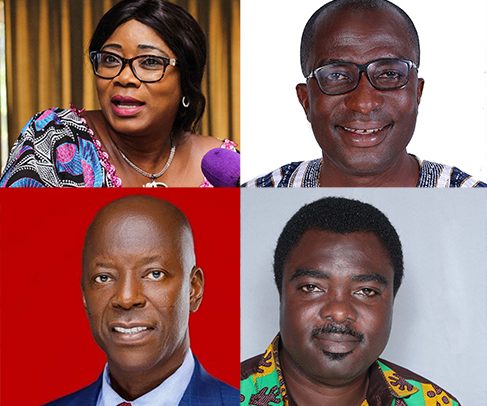TOP: Cynthia Mamle Morrison, Agona West MP, Andrew Asiamah Amoako, Fomena MP DOWN: Peter Yaw Kwakye-Ackah, Amenfi Central MP and Kwadjo Asante, Suhum MP
A drama unfolded in Parliament yesterday as the Speaker declared the seats of four Members of Parliament (MPs) vacant.
This move was prompted by the Members’ decision to switch parties or run as independent candidates, contravening Articles 97(1)(g) and (h) of the Constitution.
The Minority Leader, Dr. Cassiel Ato Baah Forson, initially raised the issue, citing the actions of Peter Yaw Kwakye-Ackah (Amenfi Central), Andrew Asiamah Amoako (Fomena), Kwadjo Asante (Suhum), and Cynthia Mamle Morrison (Agona West).
These Members had filed with the Electoral Commission (EC) to contest the upcoming 2024 parliamentary elections under different party affiliations than those they were initially elected under.
According to Article 97(1)(g) and (h), a Member of Parliament must vacate his or her seat if he leaves his or her original party to join another or choose to remain independent.
The Speaker said this provision aims to prevent “cross-carpeting” or “party switching,” a phenomenon that has historical roots in Ghana’s early Legislative Councils and Parliaments.
“Hon. Members, my humble view is that Article 97(1)(g) and (h) operate to prevent what the old school refers to as ‘cross carpeting’ or ‘carpet crossing’ as witnessed in the early Legislative Councils and Parliaments of the Gold Coast and the Republic of Ghana respectively.
“Cross-carpeting, is now part of what is referred to as ‘defection’ or ‘party switching’, when a Member of Parliament who was elected on the ticket of one political party leaves that party to join another, or when an independent MP joins a political party after being elected as an independent member or a party member acts similarly,” he stressed.
He argued that the concept of defection raises significant concerns about the integrity of political representation.
“When voters elect a candidate, they do so based not only on the individual’s personal qualities but also on the political party platform they represent. Party-switching or deflection, therefore, can be seen as a breach of the mandate and social contract between the MP and the electorate, as it changes the political dynamics that the voters originally endorsed,” Mr. Bagbin added.
These MPs, having chosen to run independently or either joined a new party, triggered their automatic removal from their parliamentary seats.
Mr. Bagbin invoked Article 97(1) of the Constitution which provides that “a Member of Parliament shall forfeit his seat in Parliament if he leaves his party which he was a member at the time of his election to Parliament to join another party or seeks to remain in Parliament as an independent member” to support the decision arrived at.
This situation echoes a similar incident in 2020 involving Andrews Asiamah Amoako, the MP for Fomena, Mr. Bagbin intimated.
According to him, at that time, the NPP notified the Speaker, Prof. Aaron Mike Oquaye, that Mr. Amoako was no longer a party member due to his decision to contest election as an independent candidate. The Speaker subsequently declared Amoako’s seat vacant.
Speaker Bagbin emphasised that determining whether an MP has resigned from his or her party or joined another is a factual matter.
He also clarified that previous rulings, such as the one made by Prof. Oquaye, do not bind future Speakers.
He argued that as per the Standing Orders of Parliament, specifically Order 18, the Speaker must inform the House of any vacancy under Article 97(1) of the Constitution.
He therefore indicated that he, by this ruling, has duly notified the House of these vacancies.
By Ernest Kofi Adu, Parliament House


